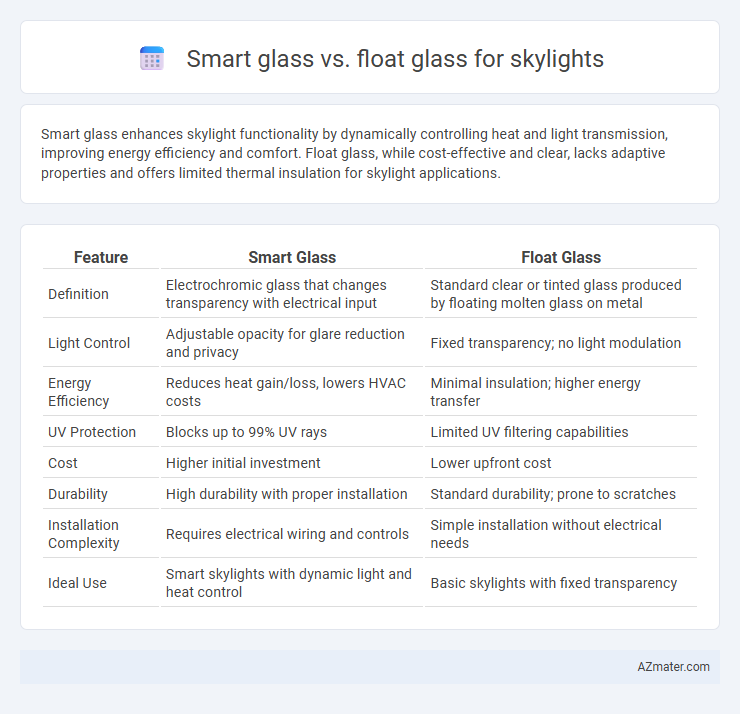Smart glass enhances skylight functionality by dynamically controlling heat and light transmission, improving energy efficiency and comfort. Float glass, while cost-effective and clear, lacks adaptive properties and offers limited thermal insulation for skylight applications.
Table of Comparison
| Feature | Smart Glass | Float Glass |
|---|---|---|
| Definition | Electrochromic glass that changes transparency with electrical input | Standard clear or tinted glass produced by floating molten glass on metal |
| Light Control | Adjustable opacity for glare reduction and privacy | Fixed transparency; no light modulation |
| Energy Efficiency | Reduces heat gain/loss, lowers HVAC costs | Minimal insulation; higher energy transfer |
| UV Protection | Blocks up to 99% UV rays | Limited UV filtering capabilities |
| Cost | Higher initial investment | Lower upfront cost |
| Durability | High durability with proper installation | Standard durability; prone to scratches |
| Installation Complexity | Requires electrical wiring and controls | Simple installation without electrical needs |
| Ideal Use | Smart skylights with dynamic light and heat control | Basic skylights with fixed transparency |
Introduction to Skylight Glass Options
Skylight glass options primarily include smart glass and float glass, each offering distinct advantages for daylighting and energy efficiency. Smart glass adapts its tint based on sunlight intensity, reducing glare and heat gain, which enhances indoor comfort and lowers cooling costs. Float glass provides clear, cost-effective light transmission but lacks the dynamic solar control found in smart glass, making it suitable for applications prioritizing budget and simple design.
Understanding Smart Glass: Features and Benefits
Smart glass for skylights offers dynamic light control by adjusting transparency, enhancing energy efficiency and occupant comfort through reduced glare and heat gain. Unlike traditional float glass, smart glass integrates electrochromic, thermochromic, or photochromic technologies, allowing automated or manual tinting to optimize natural daylight while maintaining privacy. This innovation significantly contributes to lower cooling costs and improved building sustainability compared to static float glass.
What Is Float Glass? Characteristics and Uses
Float glass is a type of flat glass made by floating molten glass on a bed of molten metal, typically tin, resulting in uniform thickness and smooth surfaces. It offers excellent clarity, strength, and cost-effectiveness, making it ideal for basic glazing applications such as windows and skylights. Commonly used in construction and automotive industries, float glass provides a clear view and natural light transmission but lacks the energy efficiency and light control features of smart glass.
Comparing Light Control in Smart Glass vs Float Glass
Smart glass offers dynamic light control by adjusting its opacity to modulate natural light penetration, reducing glare and enhancing energy efficiency in skylights. Float glass provides static transparency, allowing maximum light passage but lacking adaptability to changing daylight conditions. The ability of smart glass to switch between clear and tinted states delivers superior control over indoor lighting environments compared to conventional float glass.
Energy Efficiency: Smart Glass vs Float Glass
Smart glass significantly enhances energy efficiency in skylights by controlling solar heat gain and reducing the need for air conditioning, unlike traditional float glass which allows unrestricted heat transfer. The dynamic shading capability of smart glass minimizes cooling loads and improves occupant comfort by adjusting tint in response to external light conditions. Float glass lacks these adaptive properties, resulting in higher energy consumption and increased HVAC costs over time.
Privacy and Glare Reduction Capabilities
Smart glass offers superior privacy by allowing users to switch from transparent to opaque instantly, effectively controlling visibility through skylights. Float glass, while providing clear views and natural light, lacks dynamic privacy features, making it less effective in reducing glare without additional treatments. The active glare reduction in smart glass enhances comfort and energy efficiency by minimizing solar heat gain, unlike traditional float glass skylights.
Durability and Maintenance Requirements
Smart glass offers enhanced durability for skylights due to its ability to regulate heat and resist UV damage, reducing wear over time compared to standard float glass. Float glass, while initially more affordable, requires more frequent cleaning and potential replacement because it lacks protective coatings against environmental stressors. Maintenance for smart glass is minimal, as its adaptive properties prevent dirt accumulation and thermal stress, extending its lifespan significantly.
Aesthetic Choices and Customization
Smart glass offers dynamic tinting and privacy control, allowing users to customize light transmission and color to suit aesthetic preferences for skylights. Float glass provides a clear, smooth surface ideal for maximizing natural light but lacks adjustable features, limiting customization options. Choosing smart glass enhances design versatility and energy management, while float glass emphasizes simplicity and cost-effectiveness in skylight applications.
Cost Comparison: Installation and Long-term Value
Smart glass typically incurs higher initial installation costs than float glass due to advanced technology and specialized fitting requirements for skylights. Float glass offers a more budget-friendly upfront investment but lacks the energy efficiency and light control features that smart glass provides, impacting long-term energy savings. Over time, smart glass's ability to reduce HVAC expenses and enhance comfort can deliver greater overall value despite the steeper initial price.
Choosing the Right Glass for Your Skylight
Smart glass offers dynamic light control and energy efficiency benefits for skylights by adjusting transparency based on sunlight intensity, reducing glare and heat gain. Float glass, known for its clarity and uniform thickness, provides a cost-effective and durable option but lacks the adaptive features of smart glass. Selecting the right glass for your skylight depends on balancing budget, energy performance needs, and desired natural light management.

Infographic: Smart glass vs Float glass for Skylight
 azmater.com
azmater.com